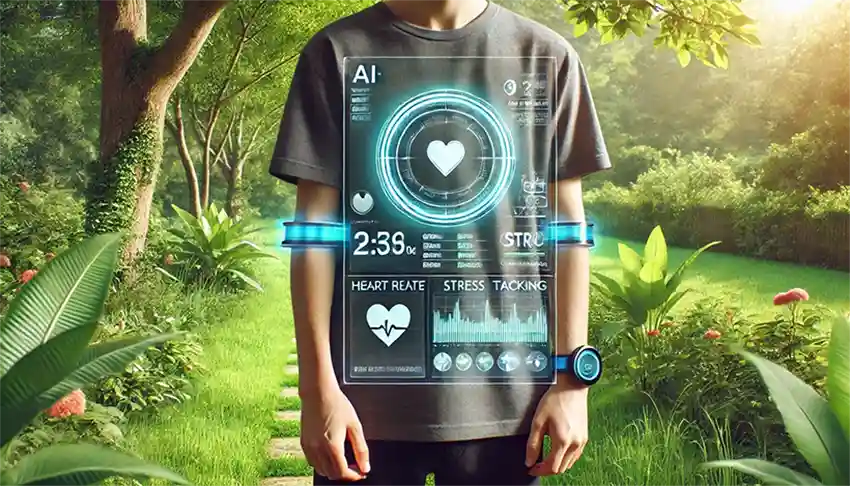Imagine a world where your smartwatch detects early signs of a heart problem before you feel any symptoms. Or where a tiny sensor tracks your blood sugar levels in real time and alerts you before a dangerous spike. This isn’t a scene from a sci-fi movie—it’s the present reality of personalized health monitoring, powered by AI-driven wearable technology.
Technology has transformed healthcare in incredible ways, and wearable health devices are at the forefront of this change. These devices offer real-time data, predictive analytics, and personalized health insights, empowering individuals to take proactive control of their well-being.
In this article, we’ll explore how AI-powered wearable technology is reshaping healthcare, improving patient outcomes, and paving the way for a smarter, healthier future.
1. What is Personalized Health Monitoring?
Personalized health monitoring refers to the use of advanced technology to track an individual’s health metrics in real-time. Unlike traditional health assessments, which rely on occasional doctor visits, wearable health devices continuously collect data, allowing for early detection of health issues and tailored healthcare recommendations.
With AI integration, these devices don’t just track health data; they analyze it, recognize patterns, and even predict potential health risks. This shift from reactive healthcare (treating illnesses) to proactive healthcare (preventing diseases) is one of the most significant advancements in modern medicine.
2. The Role of AI in Wearable Health Technology
AI is the driving force behind the intelligence of modern wearable devices. By analyzing massive amounts of health data, AI algorithms can identify patterns and trends that would be impossible for a human to detect manually.
✅How AI Enhances Wearable Health Technology:
- Real-Time Health Insights – AI helps interpret heart rate, oxygen levels, sleep patterns, and stress levels to give actionable feedback.
- Predictive Analytics – AI detects early warning signs of chronic diseases like heart disease, diabetes, and neurological disorders.
- Personalized Health Recommendations – Wearables use AI to offer tailored fitness, diet, and wellness suggestions based on individual data.
- Continuous Monitoring for At-Risk Patients – AI-powered wearables help patients with chronic illnesses manage their conditions without frequent hospital visits.
3. Popular AI-Powered Wearable Devices Transforming Healthcare
a) Smartwatches for Heart Health Monitoring
📌 Example Features:
- ECG Monitoring: Detects irregular heart rhythms and early signs of atrial fibrillation (AFib).
- Blood Oxygen Tracking: Measures oxygen saturation, which is crucial for respiratory health.
- AI-Powered Alerts: Notifies users of abnormal heart activity before serious symptoms appear.
b) Smart Rings for Sleep & Stress Tracking
📌 Example Features:
- HRV (Heart Rate Variability) Analysis: AI measures stress levels and recovery patterns.
- Sleep Cycle Tracking: Optimizes sleep patterns by detecting disturbances.
- AI-Driven Suggestions: Offers meditation and breathing exercises to improve sleep quality.
c) Continuous Glucose Monitoring (CGM) Devices for Diabetics
📌 Example Features:
- Real-Time Blood Sugar Monitoring: Eliminates the need for finger-prick tests.
- AI Alerts for High/Low Glucose Levels: Warns users of dangerous fluctuations.
- Integration with Mobile Apps: Tracks diet and activity to improve glucose management.
4. The Impact of AI Wearables on Preventive Healthcare
One of the most revolutionary aspects of AI-powered health monitoring is its ability to prevent diseases before they occur.
✅ Early Disease Detection:
- AI algorithms analyze health patterns to detect warning signs months or even years before symptoms appear.
- Wearable ECG monitors have already helped detect silent heart attacks in users, leading to life-saving interventions.
✅ Reducing Healthcare Costs:
- By preventing hospitalizations and unnecessary treatments, AI wearables lower healthcare expenses for individuals and medical systems.
✅ Improving Quality of Life:
- Patients with chronic diseases like hypertension, sleep apnea, and diabetes can receive real-time adjustments to their treatment plans without waiting for doctor appointments.
5. Challenges and Future of Personalized Health Monitoring
While AI-powered wearables offer groundbreaking advancements, some challenges remain:
🚨 Data Privacy & Security: AI health data must be protected to prevent misuse and breaches.
🚨 Accuracy & Reliability: AI predictions need continuous improvement to reduce false alerts.
🚨 Affordability & Accessibility: Making AI wearables more affordable for the general population is essential for widespread adoption.
💡 The Future?
- Smarter AI Algorithms → More accurate health predictions and personalized treatments.
- Non-Invasive Sensors → New wearables will track health metrics without the need for implants or intrusive methods.
- AI + Telemedicine Integration → Patients will receive remote consultations based on real-time wearable data.
With rapid innovations in AI-powered wearable technology, the future of healthcare is moving towards a more personalized, preventive, and data-driven approach.
Also Read This : AI in Healthcare: How Artificial Intelligence is Revolutionizing Medicine
Final Thoughts: Embracing the Future of Personalized Health Monitoring
AI-powered wearable devices are not just gadgets—they are life-changing tools that empower people to take charge of their health like never before. By providing real-time health insights, early disease detection, and personalized recommendations, these devices are redefining modern healthcare.
As technology advances, personalized health monitoring will continue to evolve, making healthcare more accessible, efficient, and tailored to individual needs. Whether you’re a fitness enthusiast, someone managing a chronic condition, or just looking to stay on top of your health, embracing AI-driven wearables can be a game-changer for your well-being.
Disclaimer : This article provides general information about personalized health monitoring and the role of AI-powered wearable technology in healthcare. It is for educational purposes only and should not be considered medical advice. Always consult a qualified healthcare professional before making any health-related decisions or using any wearable health monitoring device. Well Health Organic does not take responsibility for the accuracy, completeness, or reliability of the information provided. We do not endorse or recommend any specific products, services, or medical treatments mentioned in this article. Readers are encouraged to conduct their own research and seek professional advice when necessary.















